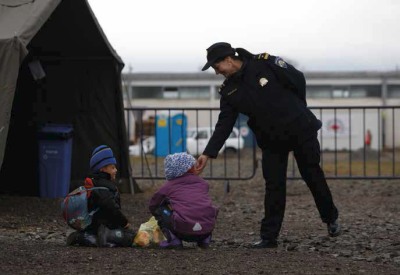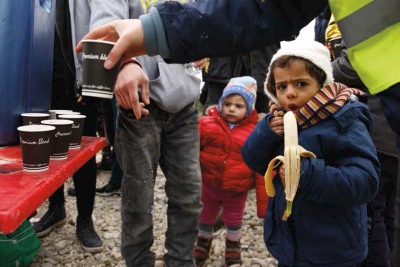articles/Photojournalism/journeyofhope-page3
A Journey of Hope - part 3 of 1 2 3 4
by Darrin Zammit-Lupi Published 01/07/2016

Within a couple of days, the area will become a temporary stopping point for over 80 buses and 6,000 tired and desperate people, after striking taxi drivers across the border in Macedonia block the railway tracks leading north. The bus pulls to a halt behind several others. The driver explains the bus won't be able to go further for several days because of the closed border. He suggests everyone disembarks and makes their way to the tents as they will freeze on the bus. Many of my travelling companions get to their feet and step out. British aid workers immediately give them blankets to wrap themselves in.
From my seat, I watch a group of around 20 of them walking towards a row of mobile toilets set up on the edge of the car park. I think nothing of it. Suddenly, they all break into a sprint and disappear into the undergrowth on the periphery. They won't find themselves back on tarmac for dozens of kilometres, as smugglers will keep them off the roads as they trek towards gaps in the still-porous border between Greece and Macedonia. These people were all so-called economic migrants, who knew they would get no further if they tried to cross at the established refugee border crossings.
Things are relatively calm at the now-infamous camp on the border at Idomeni. With the refugees being stopped at Polikastro, the numbers have dwindled. They continue to trickle towards Macedonia on foot, where, once across, they pass through the Vinojug Temporary Transit Centre outside the village of Gevgelija. The odd train is being allowed through the taxi drivers' blockade.

Many of the migrants however opt to use the taxis and buses to head further north to the border with Serbia. There is a long walk from the migrant transit camp near the Macedonia-Serbia border. Trains stop in the camp itself and disembark all their passengers. Unless they require medical care, most tend not to hang around, but immediately set off on foot. Those who do hang back sometimes try to jump onto a freight train that would be passing through.
The footpath across the border to a small camp on the Serbian side is littered with abandoned belongings. Blankets and sleeping bags flutter in the wind across the desolate and muddy landscape. Migrants only stop there for registration, and then make their way into the transit camp at Presevo, where they wait for the next available train or bus to take them up to the camps in Sid and Adasevci near the Croatian border. Croatian officials working in tandem with the Serbs question each person boarding a train at Sid to cross into Croatia. Here, we see clear evidence of how countries on the refugee route are using dangerously arbitrary criteria to determine who may and may not cross their borders - refugees must come from the 'right' country of origin and name the 'right' country of destination when questioned at the borders. Those criteria change on a regular basis. More worryingly, there doesn't appear to be any effort to listen to individuals to determine their protection needs.
Please Note:
There is more than one page for this Article.
You are currently on page 3 Contact Darrin Zammit-Lupi
1st Published 01/07/2016
last update 11/11/2019 11:46:30
More Photojournalism Articles
There are 0 days to get ready for The Society of Photographers Convention and Trade Show at The Novotel London West, Hammersmith ...
which starts on Wednesday 14th January 2026








